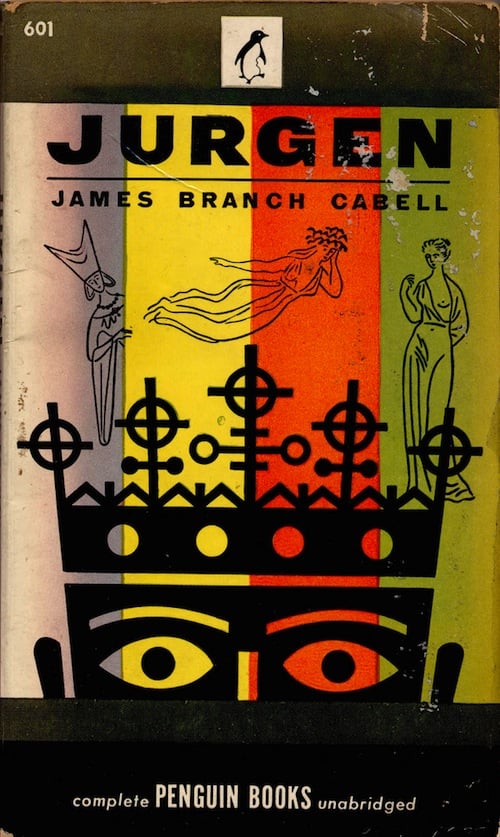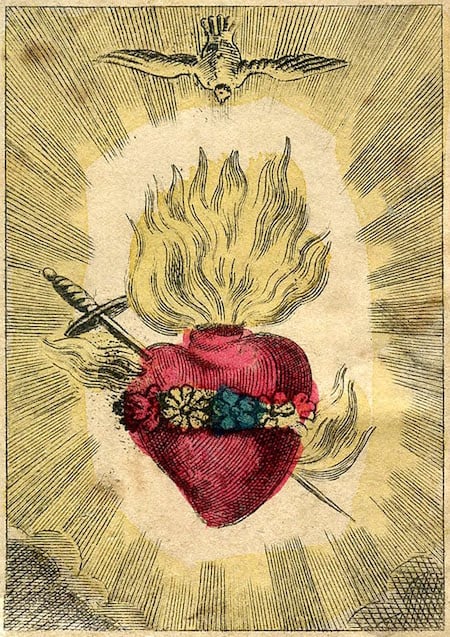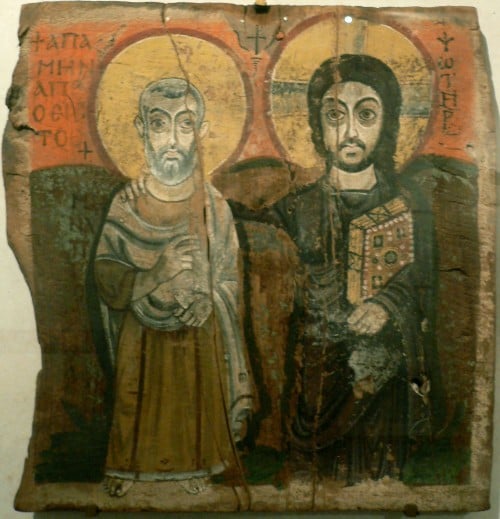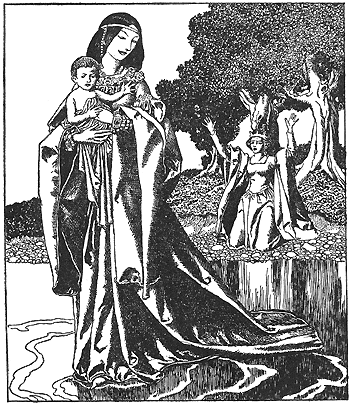Jurgen (21)
By:
August 1, 2015

James Branch Cabell’s 1919 ironic fantasy novel Jurgen, A Comedy of Justice, the protagonist of which seduces women everywhere he travels — including into Arthurian legend and Hell itself — is (according to Aleister Crowley) one of the “epoch-making masterpieces of philosophy.” Cabell’s sardonic inversion of romantic fantasy was postmodernist avant la lettre. HiLoBooks is pleased to serialize Jurgen here at HILOBROW. Enjoy!
Jurgen went in a tremble to the Cathedral of the Sacred Thorn in Cameliard. All night Jurgen prayed there, not in repentance, but in terror. For his dead he prayed, that they should not have been blotted out in nothingness, for the dead among his kindred whom he had loved in boyhood, and for these only. About the men and women whom he had known since then he did not seem to care, or not at least so vitally. But he put up a sort of prayer for Dame Lisa — “wherever my dear wife may be, and, O God, grant that I may come to her at last, and be forgiven!” he wailed, and wondered if he really meant it.
He had forgotten about Guenevere. And nobody knows what were that night the thoughts of the young Princess, nor if she offered any prayers, in the deserted Hall of Judgment.

In the morning a sprinkling of persons came to early mass. Jurgen attended with fervor, and started doorward with the others. Just before him a merchant stopped to get a pebble from his shoe, and the merchant’s wife went forward to the holy-water font.
“Madame, permit me,” said a handsome young esquire, and offered her holy water.
“At eleven,” said the merchant’s wife, in low tones. “He will be out all day.”
“My dear,” says her husband, as he rejoined her, “and who was the young gentleman?”
“Why, I do not know, darling. I never saw him before.”
“He was certainly very civil. I wish there were more like him. And a fine looking young fellow, too!”
“Was he? I did not notice,” said the merchant’s wife, indifferently.
And Jurgen saw and heard and regarded the departing trio ruefully. It seemed to him incredible the world should be going on just as it went before he ventured into the Druid forest.
He paused before a crucifix, and he knelt and looked up wistfully.
“If one could only know,” says Jurgen, “what really happened in Judea! How immensely would matters be simplified, if anyone but knew the truth about You, Man upon the Cross!”
Now the Bishop of Merion passed him, coming from celebration of the early mass. “My Lord Bishop,” says Jurgen, simply, “can you tell me the truth about this Christ?”
“Why, indeed, Messire de Logreus,” replied the Bishop, “one cannot but sympathize with Pilate in thinking that the truth about Him is very hard to get at, even nowadays. Was He Melchisedek, or Shem, or Adam? or was He verily the Logos? and in that event, what sort of a something was the Logos? Granted He was a god, were the Arians or the Sabellians in the right? had He existed always, co-substantial with the Father and the Holy Spirit, or was He a creation of the Father, a kind of Israelitic Zagreus? Was He the husband of Acharamoth, that degraded Sophia, as the Valentinians aver? or the son of Pantherus, as say the Jews? or Kalakau, as contends Basilidês? or was it, as the Docetês taught, only a tinted cloud in the shape of a man that went from Jordan to Golgotha? Or were the Merinthians right? These are a few of the questions, Messire de Logreus, which naturally arise. And not all of them are to be settled out of hand.”

Thus speaking, the gallant prelate bowed, then raised three fingers in benediction, and so quitted Jurgen, who was still kneeling before the crucifix.
“Ah, ah!” says Jurgen, to himself, “but what a variety of interesting problems are, in point of fact, suggested by religion. And what delectable exercise would the settling of these problems, once for all, afford the mind of a monstrous clever fellow! Come now, it might be well for me to enter the priesthood. It may be that I have a call.”
But people were shouting in the street. So Jurgen rose and dusted his knees. And as Jurgen came out of the Cathedral of the Sacred Thorn the cavalcade was passing that bore away Dame Guenevere to the arms and throne of her appointed husband. Jurgen stood upon the Cathedral porch, his mind in part pre-occupied by theology, but still not failing to observe how beautiful was this young princess, as she rode by on her white palfrey, green-garbed and crowned and a-glitter with jewels. She was smiling as she passed him, bowing her small tenderly-colored young countenance this way and that way, to the shouting people, and not seeing Jurgen at all.
Thus she went to her bridal, that Guenevere who was the symbol of all beauty and purity to the chivalrous people of Glathion. The mob worshipped her; and they spoke as though it were an angel who passed.
“Our beautiful young Princess!”
“Ah, there is none like her anywhere!”
“And never a harsh word for anyone, they say — !”
“Oh, but she is the most admirable of ladies — !”
“And so brave too, that lovely smiling child who is leaving her home forever!”
“And so very, very pretty!”
“— So generous!”
“King Arthur will be hard put to it to deserve her!”
Said Jurgen: “Now it is droll that to these truths I have but to add another truth in order to have large paving-stones flung at her! and to have myself tumultuously torn into fragments, by those unpleasantly sweaty persons who, thank Heaven, are no longer jostling me!”
For the Cathedral porch had suddenly emptied, because as the procession passed heralds were scattering silver among the spectators.
“Arthur will have a very lovely queen,” says a soft lazy voice.

And Jurgen turned and saw that beside him was Dame Anaïtis, whom people called the Lady of the Lake.
“Yes, he is greatly to be envied,” says Jurgen, politely. “But do you not ride with them to London?”
“Why, no,” says the Lady of the Lake, “because my part in this bridal was done when I mixed the stirrup-cup of which the Princess and young Lancelot drank this morning. He is the son of King Ban of Benwick, that tall young fellow in blue armor. I am partial to Lancelot, for I reared him, at the bottom of a lake that belongs to me, and I consider he does me credit. I also believe that Madame Guenevere by this time agrees with me. And so, my part being done to serve my creator, I am off for Cocaigne.”
“And what is this Cocaigne?”
“It is an island wherein I rule.”
“I did not know you were a queen, madame.”
“Why, indeed there are a many things unknown to you, Messire de Logreus, in a world where nobody gets any assuredness of knowledge about anything. For it is a world wherein all men that live have but a little while to live, and none knows his fate thereafter. So that a man possesses nothing certainly save a brief loan of his own body: and yet the body of man is capable of much curious pleasure.”
“I believe,” said Jurgen, as his thoughts shuddered away from what he had seen and heard in the Druid forest, “that you speak wisdom.”
“Then in Cocaigne we are all wise: for that is our religion. But of what are you thinking, Duke of Logreus?”
“I was thinking,” says Jurgen, “that your eyes are unlike the eyes of any other woman that I have ever seen.”
Smilingly the dark woman asked him wherein they differed, and smilingly he said he did not know. They were looking at each other warily. In each glance an experienced gamester acknowledged a worthy opponent.
“Why, then you must come with me into Cocaigne,” says Anaïtis, “and see if you cannot discover wherein lies that difference. For it is not a matter I would care to leave unsettled.”
“Well, that seems only just to you,” says Jurgen. “Yes, certainly I must deal fairly with you.”
Then they left the Cathedral of the Sacred Thorn, walking together. The folk who went toward London were now well out of sight and hearing, which possibly accounts for the fact that Jurgen was now in no wise thinking of Guenevere. So it was that Guenevere rode out of Jurgen’s life for a while: and as she rode she talked with Lancelot.
Footnotes from Notes on Jurgen (1928), by James P. Cover — with additional comments from the creators of this website; rewritten, in some instances, by HiLoBooks.
* Bishop of Merion — ?
* Melchisedek — By certain heretics of the early Church, Melchisedek was believed to be either Christ Himself or the Holy Ghost.
* Shem — Early heretics called the Sethians believed that Christ was really Shem, the son of Noah.
* Adam — In several Gnostic sects the First Man – Anthropos or Adamas – occupied a very important place. He stood for pure mind, emanating from God and not yet darkened by contact with matter. This First Man was often confused with the Adam of the Scriptures, and was described as “the Christ, who was from the beginning and is always; who was ever present to every generation, in a hidden manner indeed, yet ever present.”
* Logos — The Logos, in Hellenic and Hebrew philosophy, seems to express the idea of immanent reason in the world. Almost every Gnostic and Christian writer of the early Church gave it a different meaning. Some taught that it was an emanation from God; some that it was immanent in God; some that it was the counselor of God; and some that it was the creative power of God, which became the man Jesus.
* Arians — The Arians were followers of Arius, an early leader in the Church, who held that Christ was not one with God, but a lesser god, created by Him. His doctrines were denied by the Church at the famous council of Nicaea, in 325.
* Sabellians — These were followers of Sabellius, who taught the unity of God, and that the Trinity merely expressed three states of one and the same God.
* Zagreus — Zagreus was a surname for the mystic Dionysus, whom Zeus, in the form of a serpent, is said to have begotten on Persephone before she was carried off by Pluto. He was torn to pieces by the Titans. His remains were buried at Delphi and Athene brought to his heart to Zeus, who swallowed it and thereupon brought forth a new Dionysus, called Iacchus.
* Acharamoth — Acharamoth – more generally called Sophia Achamoth – was, according to certain branches of the Valentinians, the fallen and degraded Sophia (i.e., divine spirit), or the personification of the material world. Achamoth was to be redeemed and lifted into spiritual purity by marriage with Christ. Mr. Cabell follows Flaubert in this unusual spelling of the word.
* Valentinians — The Valentinians were followers of Valentinus, who sought to reconcile Gnosticism and Christianity, and was, perhaps, the most prominent leader of the Gnostics.
* Pantherus — According to early Jewish texts hostile to Christianity, the birth of Jesus was due to an illicit or even adulterous union of his parents. The father was a common soldier, named Pantherus.
* Kalakau — According to The Encyclopedia Britannica, the followers of Basilidês did not regard Kalakau as a god or as a form of Christ; but as a mystic word which Christ used in His ascent to and descent from heaven. They believed that, armed with this word, they could conquer all the demons that sought to hinder their passage to the highest heaven. Mr. Cabell follows Flaubert who, in The Temptation of St. Anthony, makes Basilidês say that “the Savior with all his virtues” is called Kaulakau.
* Basilidês — Basilidês was one of the most celebrated of the early Gnostic teachers. He lived in Alexandria, probably in the early part of the second century. His actual beliefs are not known and have been the subject of much controversy.
* Docetes — The Docetês were an early heretical sect that maintained that Jesus Christ was God only, and that His visible form was merely a phantom.
* Merinthians — Merinthians was an infrequent, and perhaps derogatory, name (Merinthus – noose) applied to the Cerinthians, the followers of Cerinthus. Cerinthus taught that the world was not created by the real God, but by one of God’s inferior angels, who became the God of the Jews; that Jesus was a mortal, the son of Joseph and Mary, and that, after his baptism, Christ descended to him in the form of a dove.
* Lancelot — Sir Lancelot, son of King Ban of Benwick and heir to the kingdom of France, was the bravest and greatest of Arthur’s knights. When still a child, he was stolen from his mother by the Lady of the Lake, and brought up by her in her domain of Fairyland. His love for Guenevere caused the breaking up of the Fellowship of the Round Table, and led to the wars in which Arthur met his death.
* Cocaigne — Cocaigne was a medieval Utopia wherein “the rivers were of wine, the houses were built of cake and barley-sugar, the streets were paved with pastry, and the shops supplied goods for nothing. Roast geese and fowls wandered about inviting folks to eat them, and buttered larks fell from the skies.” The name is now used to designate a land that is perfect in every way.
RADIUM AGE SCIENCE FICTION: “Radium Age” is HILOBROW’s name for the 1904–33 era, which saw the discovery of radioactivity, the revelation that matter itself is constantly in movement — a fitting metaphor for the first decades of the 20th century, during which old scientific, religious, political, and social certainties were shattered. This era also saw the publication of genre-shattering writing by Edgar Rice Burroughs, Sax Rohmer, E.E. “Doc” Smith, Jack London, Arthur Conan Doyle, Aldous Huxley, Olaf Stapledon, Karel Čapek, H.P. Lovecraft, Charlotte Perkins Gilman, Yevgeny Zamyatin, Philip Gordon Wylie, and other pioneers of post-Verne/Wells, pre-Golden Age “science fiction.” More info here.
READ GORGEOUS PAPERBACKS: HiLoBooks has reissued the following 10 obscure but amazing Radium Age science fiction novels in beautiful print editions: Jack London’s The Scarlet Plague, Rudyard Kipling’s With the Night Mail (and “As Easy as A.B.C.”), Arthur Conan Doyle’s The Poison Belt, H. Rider Haggard’s When the World Shook, Edward Shanks’ The People of the Ruins, William Hope Hodgson’s The Night Land, J.D. Beresford’s Goslings, E.V. Odle’s The Clockwork Man, Cicely Hamilton’s Theodore Savage, and Muriel Jaeger’s The Man with Six Senses. For more information, visit the HiLoBooks homepage.
SERIALIZED BY HILOBOOKS: Jack London’s The Scarlet Plague | Rudyard Kipling’s With the Night Mail (and “As Easy as A.B.C.”) | Arthur Conan Doyle’s The Poison Belt | H. Rider Haggard’s When the World Shook | Edward Shanks’ The People of the Ruins | William Hope Hodgson’s The Night Land | J.D. Beresford’s Goslings | E.V. Odle’s The Clockwork Man | Cicely Hamilton’s Theodore Savage | Muriel Jaeger’s The Man With Six Senses | Jack London’s “The Red One” | Philip Francis Nowlan’s Armageddon 2419 A.D. | Homer Eon Flint’s The Devolutionist | W.E.B. DuBois’s “The Comet” | Edgar Rice Burroughs’s The Moon Men | Charlotte Perkins Gilman’s Herland | Sax Rohmer’s “The Zayat Kiss” | Eimar O’Duffy’s King Goshawk and the Birds | Frances Hodgson Burnett’s The Lost Prince | Morley Roberts’s The Fugitives | Helen MacInnes’s The Unconquerable | Geoffrey Household’s Watcher in the Shadows | William Haggard’s The High Wire | Hammond Innes’s Air Bridge | James Branch Cabell’s Jurgen | John Buchan’s “No Man’s Land” | John Russell’s “The Fourth Man” | E.M. Forster’s “The Machine Stops” | John Buchan’s Huntingtower | Arthur Conan Doyle’s When the World Screamed | Victor Bridges’ A Rogue By Compulsion | Jack London’s The Iron Heel | H. De Vere Stacpoole’s The Man Who Lost Himself | P.G. Wodehouse’s Leave It to Psmith | Richard Connell’s “The Most Dangerous Game” | Houdini and Lovecraft’s “Imprisoned with the Pharaohs” | Arthur Conan Doyle’s “The Sussex Vampire.”
ORIGINAL FICTION: HILOBROW has serialized three novels: James Parker’s The Ballad of Cocky The Fox (“a proof-of-concept that serialization can work on the Internet” — The Atlantic); Karinne Keithley Syers’s Linda Linda Linda (which includes original music); and Robert Waldron’s roman à clef The School on the Fens. We also publish original stories and comics. These include: Matthew Battles’s stories “Gita Nova“, “Makes the Man,” “Imago,” “Camera Lucida,” “A Simple Message”, “Children of the Volcano”, “The Gnomon”, “Billable Memories”, “For Provisional Description of Superficial Features”, “The Dogs in the Trees”, “The Sovereignties of Invention”, and “Survivor: The Island of Dr. Moreau”; several of these later appeared in the collection The Sovereignties of Invention | Peggy Nelson’s “Mood Indigo“, “Top Kill Fail“, and “Mercerism” | Annalee Newitz’s “The Great Oxygen Race” | Flourish Klink’s Star Trek fanfic “Conference Comms” | Charlie Mitchell’s “A Fantasy Land” | Charlie Mitchell’s “Sentinels” | Joshua Glenn’s “The Lawless One”, and the mashup story “Zarathustra vs. Swamp Thing” | Adam McGovern and Paolo Leandri’s Idoru Jones comics | John Holbo’s “Sugarplum Squeampunk” | “Another Corporate Death” (1) and “Another Corporate Death” (2) by Mike Fleisch | Kathryn Kuitenbrouwer and Frank Fiorentino’s graphic novel “The Song of Otto” (excerpt) | John Holbo’s graphic novel On Beyond Zarathustra (excerpt) | “Manoj” and “Josh” by Vijay Balakrishnan | “Verge” by Chris Rossi, and his audio novel Low Priority Hero | EPIC WINS: THE ILIAD (1.408-415) by Flourish Klink | EPIC WINS: THE KALEVALA (3.1-278) by James Parker | EPIC WINS: THE ARGONAUTICA (2.815-834) by Joshua Glenn | EPIC WINS: THE MYTH OF THE ELK by Matthew Battles | TROUBLED SUPERHUMAN CONTEST: Charles Pappas, “The Law” | CATASTROPHE CONTEST: Timothy Raymond, “Hem and the Flood” | TELEPATHY CONTEST: Rachel Ellis Adams, “Fatima, Can You Hear Me?” | OIL SPILL CONTEST: A.E. Smith, “Sound Thinking | LITTLE NEMO CAPTION CONTEST: Joe Lyons, “Necronomicon” | SPOOKY-KOOKY CONTEST: Tucker Cummings, “Well Marbled” | INVENT-A-HERO CONTEST: TG Gibbon, “The Firefly” | FANFICTION CONTEST: Lyette Mercier’s “Sex and the Single Superhero”
